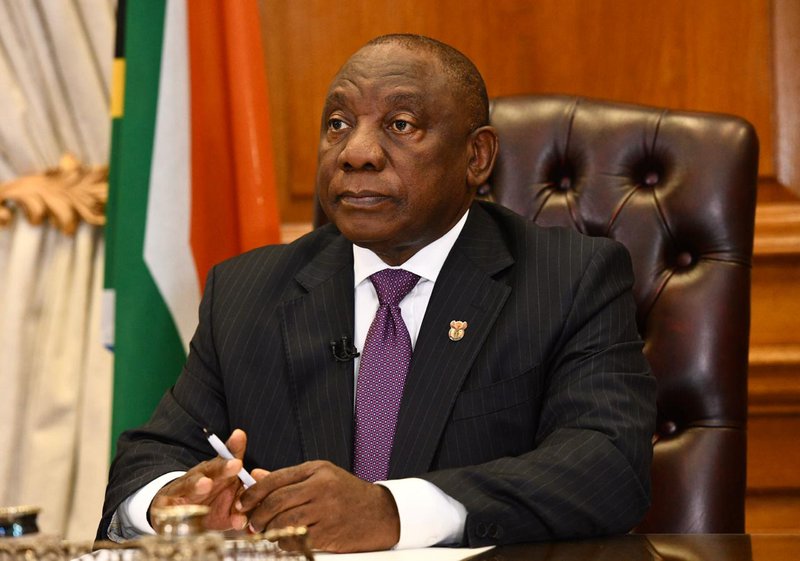Opposition parties have slammed the committee as a farcical waste of time, while analysts say it may be an attempt to shield the president from those within his own party, who would accuse him of being on a witch-hunt.

President Cyril Ramaphosa.
The decision to establish a ministerial committee to investigate their peers and comrades’ supposed involvement in PPE and other tender fraud is no more than an attempt to create a buffer between President Cyril Ramaphosa and his rivals within the ANC, according to experts.
Cabinet’s recently-announced decision to rope government ministers in on investigations into the alleged looting of state resources earmarked for the fight against Covid-19, has drawn sharp criticism from pundits and opposition parties alike.
They say the move – punted as a show of political will to fight corruption – does nothing to foster public confidence in government.
“Ultimately one can’t expect the ANC to adequately police itself,” the director of the Political Futures Consultancy, Daniel Silke, said in response to the announcement.
“It has proven itself to be largely incapable of that – especially when there are vested political interests at play.”
The announcement was made on Thursday by way of a statement from the Presidency, which said following a decision taken by Cabinet, a ministerial committee had been appointed “to deal with allegations of corruption associated with the country’s response to the coronavirus pandemic.”
It went on to say the committee would comprise of Minister in the Presidency Jackson Mthembu, Justice Minister Ronald Lamola, Finance Minister Tito Mboweni, Police Minister Bheki Cele, Public Service and Administration Senzo Mchunu, and Cooperative Governance and Traditional Affairs Minister Nkosazana Dlamini-Zuma.
Family members of a number of prominent political figures – including the President’s spokesperson, Khusela Diko; ANC secretary-general Ace Magashule; and Environmental Affairs Minister Nomvula Mokonyane – have apparently scored big from Covid-19-related tenders.
Political analyst Dr Somadoda Fikeni said the issue was one of credibility.
“Some of their (the ministerial committee’s) fellow cabinet ministers may be implicated,” he pointed out, adding a panel of retired judges would have been better suited to the task at hand.
“I think that generally government might be running out of tools with which to convince people that its interventions are credible,” Fikeni went on.
“The various commissions of inquiry have not yielded results and nor has the reconfiguration of the National Prosecuting Authority.”
Silke described the ministerial committee as a “safety valve” for the President.
“It’s designed more to manage the political fallout of any investigation,” Silke said.
He pointed to the allegations of Covid-19 corruption as being “part of the factional battles that exist within the ANC.”
“Having a number of key personalities and senior politicians on this task team is intended to give a sense of balance,” Silke said.
“It’s designed to take the heat off the President and allow a variety of different personalities to pontificate so as to lessen the political burden on Ramaphosa himself.”
And Fikeni agreed.
“The ANC is highly factionalised and it helps the President create an impression that he’s not on a political witch hunt,” he said, adding that it also created distance between Ramaphosa and any findings that might be made against his allies.
The DA’s Geordin Hill-Lewis, meanwhile, labelled the move “farcical” and a “complete joke”.
“Why would ministers of government investigate corruption in their own government and, in some cases, in their own cabinet?” Hill-Lewis asked.
“They obviously have wide-ranging powers in their own departments to look into how money was spent, but they don’t have any powers to investigate or, moreover, to do anything about what their investigations might find.”
He said the investigations should be left in the hands of the country’s law enforcement agencies.
He also highlighted the costs that the task team would incur, saying: “We must ask how much is being spent and how that expenditure is being authorised because this is not a function of the executive.”
Both the Economic Freedom Fighters (EFF) and the Congress of the People (COPE) have publicly slammed the move too.
“Such a decision is a waste of time, irrational and a clear sign of lack of leadership,” the former said in a statement. “The executive is the one that is being accused of corruption, wrongdoing, maladministration and negligence and they therefore cannot be the same people who are investigating themselves.”
The party described the appointment of the ministerial committee as “a public relations exercise aimed at misleading the people of South Africa that government is fighting corruption whilst it is part of the problem.”
COPE’s national spokesperson, Dennis Bloem, earlier this week called it “an insult to the people of the country.”
“We don’t have any trust in these ministers to investigate anything that has to do with corruption,” Bloem said.
“There are serious allegations against some of their colleagues who are also suspects. This is not a political matter. It is a criminal matter.”
For more news your way, download The Citizen’s app for iOS and Android.
Download our app